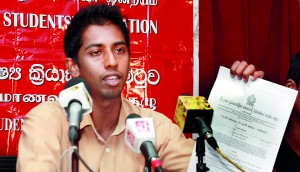News
Fee-levying private/State universities a degree closer
The Higher Education Minister has gazetted rules for institutes to be recognised as Degree-awarding institutes.
The rules made under the Universities Act, cited as Specified Authority (Powers relating to Recognition of Institutes as Degree-Awarding Institutes) set out guidelines for the recognition of State or Non-State Institutes as Degree-Awarding Institutes, and be authorised to grant Degree/s by such Institutes.
Under the rules, the Higher Education Minister will set up a Standing Committee on Accreditation and Quality Assurance (“SCAQA”), the Institutional Review Panel and the Subject Review Panel, as he deems necessary, to assist him perform the tasks specified in these rules.
The SCAQA, the Institutional Review Panel and the Subject Review Panel will perform the duties assigned to such Committees and Panels under these rules, in considering the applications referred to them in accordance with the guidelines

A representative of the Medical Faculty of the Inter University Students Federation (IUSF) protests against new regulations gazetted by the Minister of Higher Education for the recognition of institutes as Degree-awarding institutes. Pix by Indika Handuwala
Under the regulations, any institute which intends to obtain recognition as a Degree-Awarding Institute and be authorised to confer Degree/s, will need to submit a two-part application containing true and accurate information as required, to be permitted to operate in the country.
The Specified Authority has the power to reject and return by registered post any application not conforming with the provisions of these rules, with reasons thereof.
The evaluation of applications will be aimed at examining the degree of capacity of the Institute to fulfill the institutional review criteria and the standards in relation to six components specified in the guidelines.
Institutions that wish to gain recognition will be required to have a governance structure with a clearly defined hierarchy such as a Board of Governors or Board of Management, an Academic Syndicate (or Senate), Faculty Boards, Academic Departments, and Centres/Units, with the composition and functions of such bodies clearly defined.
Moreover, the roles and responsibilities of the relevant officials involved (i.e. Chief Executive Officer, Deans, Heads of Departments, Registrar, Bursar, etc.) who are accountable for administrative, academic and financial matters, should be identified and clearly stated.
The institutions will also have to clearly demonstrate its financial capacity and viability. Further, it must provide assurance and place sureties in place to face contingencies/emergencies and meet compensations for students and employees, if the institute is faced with suspension of its operation and activities.
The institute will have to establish all physical facilities required to operate as a higher educational institute. The institute must have an administrative complex and facilities for educational activities. These include administrative complex/building, lecture rooms, auditorium, student teaching and training laboratories, library, computer facilities , sports and recreational facilities, a cafeteria and rest rooms, and, in the case of professional courses, the institution must have its own training facility/hospital, or have access to a suitable training facility/hospital, as the case may be.
If the training facility/hospital is a government concern, partnership should be formalised by means of a Memorandum of Understanding and implemented through an Agreement.
The institute will also have to demonstrate its capacity to plan and conduct academic training programmes that would meet the standards and quality assurance criteria defined by the Authority .
The Institute will have a minimum number of academic staff on a permanent basis, or on long-term contracts. The academic staff must possess basic and postgraduate qualifications from recognized universities in the relevant field, together with sufficient teaching experience. They also should have information and a plan for academic and non-academic cadre positions, suitable staff development programmes and continuing professional development. Moreover, the academic staff should possess competencies and demonstrate continuous engagement in research and development
comments powered by Disqus
